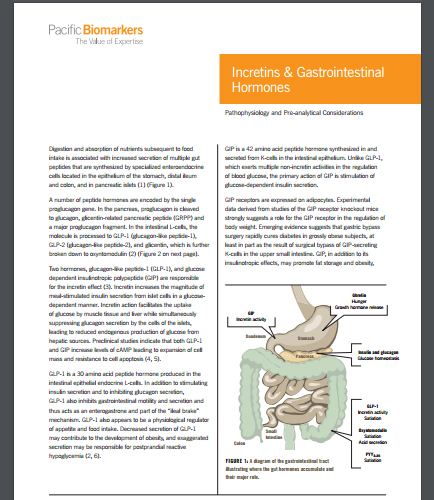
PROCESSING. PLEASE WAIT...


White Paper: Pacific Biomarkers
Testing for incretins, and other gut hormones, presents numerous challenges because of their instability. Therefore, proper sample collection and meticulous pre-analytical and analytical sample handling are crucial for successful quantification of these biomarkers. Incretins, which are insulinotropic gastrointestinal hormones, are produced mainly in K and L cells of the small intestine under the influence of nutritional stimuli.
This insightful whitepaper sees into queries like:
What are the significant challenges in the measurement of incretins and gut hormones?
What is the best practice for minimizing pre-analytical variability associated with blood collection, processing and storage?
What are the additional pre-analytical steps that should be considered when samples are obtained for quantification of active acylated ghrelin?
Download this whitepaper that provides insights about the challenges, best practices and major concerns regarding commercial assays for reliable quantification of incretins and gut hormones and specific pre-analytical and analytical processes as well as data analysis to improve sensitivity.
By: CallMiner
Speech analytics as a technology is used to analyze customer conversations taking place through phone and/or interactive voice response (IVR) during or after the call. Don’t just analyze data, use speech analytics to deliver actionable guidance to employees to support them in doing their jobs. Research shows that 37% of speech analytics users currently use voice biometrics in support of their activities. This whitepaper on “Speech Analytics: Convert Voice of the Customer into Business Success,” highlights: How to lay the right foundation for your Speech Analytics Program Massive returns that companies see by incorporating speech analytics Building blocks that help organizations maximize the benefits they see from this technology
By: Pacific Biomarkers
Biomarkers for the prediction of acute kidney injury: A review on current status and future challenges Biomarker of acute kidney injury (AKI) is strongly associated with increased morbidity and mortality in critically ill patients. The approach to analyzing AKI biomarkers has been to provide pharmaceutical and biotech companies with services for testing robust novel biomarkers that have undergone thorough analytical validation and clinical qualification with the expectation to diagnose early organ injury. Read this insightful whitepaper on ''Biomarkers for early detection of acute kidney injury'' to know more on: How to target biomarkers that can detect acute kidney injury (AKI) and what the potential of an AKI biomarker program is. What are the issues surrounding the best methods of collecting and storing urine used for detection of AKI in human subjects? Acute kidney injury biomarkers performance assesment


 2025 All Rights Reserved | by: www.ciowhitepapersreview.com
2025 All Rights Reserved | by: www.ciowhitepapersreview.com